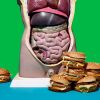-
 +23 +1
+23 +1Dietary fat is not a major determinant of body fat.
The percentage of energy from fat in diets has been thought to be an important determinant of body fat, and several mechanisms have been proposed. Comparisons of diets and the prevalence of obesity between affluent and poor countries have been used to support this relationship, but these contrasts are seriously confounded by differences in physical activity and food availability.
-
 +14 +1
+14 +1Obesity rising faster in rural areas than cities
Obesity is increasing more rapidly in the world’s rural areas than in cities, according to a new study of global trends in body-mass index (BMI). The research, led by Imperial College London and published in Nature, analysed the height and weight data of more than 112 million adults across urban and rural areas of 200 countries and territories between 1985 and 2017.
-
 +33 +1
+33 +1Stop Celebrating Obesity: Fat Acceptance Does More Harm Than Good
Growing up, I was never happy with my body. While I can look back and say I was a completely normal, healthy girl; young peers are unforgiving, and the social stigma of poverty conspired with my rapidly developing body to make me a perfect target for cruel bullying. I remember starting my first diet when I was 12.
-
 +41 +1
+41 +1Obesity poised to overtake smoking as leading preventable cause of cancer
You probably don't know second leading cause of cancer, because the scientists have only recently made the connection. It's obesity.
-
 +7 +1
+7 +1Children in U.S. don't drink enough water, opt for sugary juice instead
On any given day, 1 in 5 American youngsters don't drink any water at all, a new survey shows -- and those who don't end up consuming almost twice as many calories from sugar-sweetened beverages.
-
 +21 +1
+21 +1Genetic Basis of Obesity Carries Weight
There are, undoubtedly, many factors that go into a person’s weight. A new report from the lab of Sekar Kathiresan, M.D., director of the Center for Genomic Medicine at Massachusetts General Hospital, documents a clear biologic basis for the predisposition of obesity. More specifically, that genetics play a role in how heavy a person gets.
-
 +16 +1
+16 +1Want to fix obesity and climate change at the same time? Make Big Food companies pay.
A new report says food companies are pursuing profit at the expense of public and environmental health. That has to change. Obesity, climate change, and malnutrition are among the greatest global crises facing our world today. Wouldn’t it be great if there were solutions to tackle all three problems at once? That might sound far-fetched. But a new report, published Sunday in the Lancet, implores us to think about the possibility of big, systemic fixes for these interrelated scourges.
-
 +17 +1
+17 +1Skinny genes the 'secret to staying slim'
Scientists say they have discovered the secret behind why some people are skinny while others pile on the pounds easily. Their work reveals newly discovered genetic regions linked to being very slim. The international team say this supports the idea that, for some people, being thin has more to do with inheriting a "lucky" set of genes than having a perfect diet or lifestyle. The study appears in PLOS Genetics.
-
 +41 +1
+41 +1Our pets: the key to the obesity crisis?
Even animals that aren’t eating too much or exercising too little are getting fat. If we can figure out why, we may have the key to our own obesity crisis – and how to stop it.
-
 +14 +1
+14 +1Study: Bias Drops Dramatically For Sexual Orientation And Race — But Not Weight
New research from Harvard University finds that Americans' unconscious bias on the basis of sexual orientation and race dropped dramatically over a decade. The study in the journal Psychological Science looks at more than 4 million online tests for implicit bias — bias people aren't aware of — taken from 2007 to the end of 2016.
-
 +1 +1
+1 +1Fat Gets No Respect (But That Should Change)
In this original animated video, anthropological research helps reveal the surprising story behind fat in the human body and in cultures around the world.
-
 +14 +1
+14 +1Relationship Between Low Income and Obesity is Relatively New
It’s a fact: poverty and obesity are intimately connected. But this relationship is only about 30 years old, according to a new study coauthored by UT researchers and published in Palgrave Communications, an open-access, online journal. “We found that the relationship between low income and high rates of adult obesity in the U.S. is not observable until the early 1990s,” said Alex Bentley, head of UT Department of Anthropology and coauthor of the study. “As recently as 1990, this was not a detectable problem,”
-
 +23 +1
+23 +1Why Are We Still So Fat?
Only bariatric surgery reliably leads to long-term weight loss. Now scientists hope to duplicate the effects with a pill.
-
 +23 +1
+23 +1New CRISPR technique could prevent obesity without cutting or editing a genome
An exciting new study has demonstrated how a new kind of CRISPR technique can increase the expression of certain genes, instead of the more traditional approach of cutting or editing DNA. The method was tested in mice, targeting genes associated with hunger, and stopped the animals becoming obese.
-
 +12 +1
+12 +1Children mirror weight gain and losses of their mothers but not fathers
Children mirror the weight gain and losses of their mothers but not their fathers, a study has found.
-
 +31 +1
+31 +1We Burn More Calories in the Afternoon and Evening, Study Finds
Our weight might not be controlled solely by what we eat. When we eat, and when we get to sleep, may be just as important. A small study published this week in Current Biology found people who had been thrown off their circadian rhythms burn more calories in the late afternoon and evening hours than in the morning, when calorie burn is at its lowest. Later in the day, calorie burn increases by 10 percent, or about 129 calories.
-
 +7 +1
+7 +1Obesity to be 'main cancer risk in women'
Obesity is set to overtake smoking as the biggest preventable cause of cancer in UK women by 2043, a Cancer Research UK report predicts. Currently, 12% of cancers in women are linked to smoking, and 7% to being overweight and obese. But with the number of smokers falling and obesity rates projected to rise, the charity estimates that gap will disappear in 25 years time. The figures assume that current trends will continue.
-
 +2 +1
+2 +1Weight-loss pill hailed as 'holy grail' in fight against obesity
A weight-loss pill has been hailed as a potential “holy grail” in the fight against obesity after a major study showed it did not increase the risk of serious heart problems. Researchers say lorcaserin is the first weight-loss drug to be deemed safe for heart health with long-term use. Taken twice a day, the drug is an appetite suppressant which works by stimulating brain chemicals to induce a feeling of fullness.
-
 +15 +1
+15 +1Half Of Americans Are Trying To Lose Weight, Including Many Who Are Not Overweight, CDC Reports
Nearly half of adults in America tried to lose weight within the span of a year, according to 2013-2016 data reported in a first-of-its-kind report.
-
 +12 +1
+12 +1Study: Cycling daily reduces obesity - unless it's an e-bike
A study of travel habits in seven European cities has found that people who ride their bikes daily have the lowest body mass index (BMI) of any class of transport user – unless the bicycle in question is an electric one, in which case they rank second only to motorists in terms of obesity levels.
Submit a link
Start a discussion




















